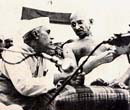'The influence of money power in public life was not that great in the old days as it is today'
In your opinion, is there some way that India's poor can be
liberated from the awful reality of their situation? Is there
no way poverty can be overcome?
 There are many ways to overcome poverty. Some people believe that
prosperity at the top levels of society will have a trickle down
effect and in due course prosperity will reach all people. But
such theories are invalid in a vast subcontinent like ours where
the disparities between the haves and the have nots is very vast.
Poverty eradication has no fixed formula or readymade medicine
as solution. We have to approach the problem from various programmes
taking into account the special and needs of people at different
levels of development.
There are many ways to overcome poverty. Some people believe that
prosperity at the top levels of society will have a trickle down
effect and in due course prosperity will reach all people. But
such theories are invalid in a vast subcontinent like ours where
the disparities between the haves and the have nots is very vast.
Poverty eradication has no fixed formula or readymade medicine
as solution. We have to approach the problem from various programmes
taking into account the special and needs of people at different
levels of development.
If you ask me how much time it will take to tackle the problem
of poverty effectively, I will say that ten more years may be
adequate. The process of development in the coming years
need not take the same length of time as in the past because of
the great technological innovations the world has seen in the
last few years in communication, transport, health care, etc.
New technology can help to shorten the transition period.
How do you assess the economic reforms? Do you believe liberalisation
will make India an economic superpower?
We are not thinking in terms of becoming an economic superpower.
But certainly we can become one of the largest and strongest economies
of the world. In spite of the great inequalities in our society,
we have developed over a period of time a reservoir of technical
competence in various sectors which can help us build our economy
into one of the strongest in the world.
Whether it is in industry, agriculture or services, the key word
now is technology. In the old text books on economics, we used
to read about factors for production of wealth namely land, capital,
labour and entrepreneurship. Today, the fifth and most important
factor is technology. New technology is crucial not only for manufacture
and services but also for agriculture. With improved seeds, new
methods of cultivation and management of water, fertiliser, etc,
Indian agriculture can reach much higher levels of efficiency
in much quicker time than it has been possible in the past.
Why, if these reforms are so essential for India's future,
did prime ministers before P V Narasimha Rao and finance ministers
before Dr Manmohan Singh not commence this process?
 To answer that question, one has to look not at the priorities
of the government but the world situation as a whole in the decades
immediately after our Independence. Fifty years ago, our pressing
problems were shortage of capital, of foreign exchange and shortage
of trained manpower. We had to depend heavily on imports even
to meet the demand for ordinary consumer goods, while dependent
on imports and foreign aid, we had also to be on the guard about
preserving the content of our Independence without dilution. We
did not want to take any short cut to economic progress, sacrificing
our goal of self reliance.
To answer that question, one has to look not at the priorities
of the government but the world situation as a whole in the decades
immediately after our Independence. Fifty years ago, our pressing
problems were shortage of capital, of foreign exchange and shortage
of trained manpower. We had to depend heavily on imports even
to meet the demand for ordinary consumer goods, while dependent
on imports and foreign aid, we had also to be on the guard about
preserving the content of our Independence without dilution. We
did not want to take any short cut to economic progress, sacrificing
our goal of self reliance.
We have achieved a reasonable degree
of success in building up self reliance in most of the development
sectors. We opted for liberalisation after establishing a solid
foundation for a self reliant economy and with the confidence
that the time had arrived for such a bold step.
Were the priorities of previous governments different? Have
the priorities changed over the years?
It is not that the objectives that we had during the Nehru regime
were different. They were relevant to the conditions at that time.
But now the world economy itself has changed and we also decided
to introduce the changes relevant to the new circumstances.
The systems of licensing and control and tariff and non-tariff
barriers in the world trade as a whole had been relaxed in recent
years and we wanted to take full advantage of the global phenomenon
of liberalisation. As far as India was concerned, liberalisation
was both necessary and timely as we had reached a stage on our
economic progress conducive to liberalisation.
 So I will say it was timely. We took the steps when we realised
that if we didn't, India would be left far behind. These steps
towards liberalisation had been initiated as early as 1980-81.
Slowly, some of the controls from industry had been relaxed, import
licensing had been relaxed. Step by step, the licensing procedures
were relaxed, the walls of quotas and controls were reduced. By
the beginning of the 1990s, compulsions of the time made us take
a very giant step at a speed much greater than what was possible
earlier and thus we ushered the era of liberalisation.
So I will say it was timely. We took the steps when we realised
that if we didn't, India would be left far behind. These steps
towards liberalisation had been initiated as early as 1980-81.
Slowly, some of the controls from industry had been relaxed, import
licensing had been relaxed. Step by step, the licensing procedures
were relaxed, the walls of quotas and controls were reduced. By
the beginning of the 1990s, compulsions of the time made us take
a very giant step at a speed much greater than what was possible
earlier and thus we ushered the era of liberalisation.
You said earlier that when you joined the IAS there was no
cynicism or lack of faith in the civil services. How did this
contempt for idealism, this corruption creep in? Why is there
such disdain for the people in the bureaucracy?
There is an element of truth in what you say about contempt for
idealism or disdain in the bureaucracy. I can attribute it to
a variety of reasons. When we started as young entrants
to the civil service, we were still largely sheltered from public
criticism and not subjected to the scrutiny by the press or by
the judiciary as the case today.
For at least the first ten years of Independence, the civil servant
enjoyed a large measure of protection. If anyone criticised him,
his ministers would defend him if his bonafides were not in doubt.
I will also say that the civil servants's failures and foibles
were to a large extent shielded from the glare of publicity. Our
democratic system of accountability itself had not developed adequately
in those years.
Secondly, we have to admit that the standards of integrity have
deteriorated from the days of the older generation to those of
the present. You can say that about every field of public service
whether it is politics, civil service, education, health or any
other. We have to admit that there has been a deterioration in
the standards of integrity. At any rate the influence of money
power in public life was not that great in the old days as it
is today.
 I should add here that the older generation in India had been
very powerfully influenced by the life and teachings of Mahatma
Gandhi. Even those who disagreed with Gandhi's political strategies,
never could question his ideals of integrity, simplicity, probity
and sacrifice in public life. These values had deeply influenced
a whole generation of Gandhi's India. I'm not saying that Gandhiji's
teachings have ceased to have any influence among present day
Indians.
I should add here that the older generation in India had been
very powerfully influenced by the life and teachings of Mahatma
Gandhi. Even those who disagreed with Gandhi's political strategies,
never could question his ideals of integrity, simplicity, probity
and sacrifice in public life. These values had deeply influenced
a whole generation of Gandhi's India. I'm not saying that Gandhiji's
teachings have ceased to have any influence among present day
Indians.
What I am saying is that there has been a general lowering
of standards of probity and integrity in the society as a whole
since the days of the Mahatma and to some extent this is seen
reflected in the ranks of the civil servants as well. Perhaps
people expect from the civil servants more exemplary standards
of integrity and this may well be justified as the citizen wants
the administration to be not only efficient but also clean.
Dr Alexander's photographs: Jewella C Miranda
|

